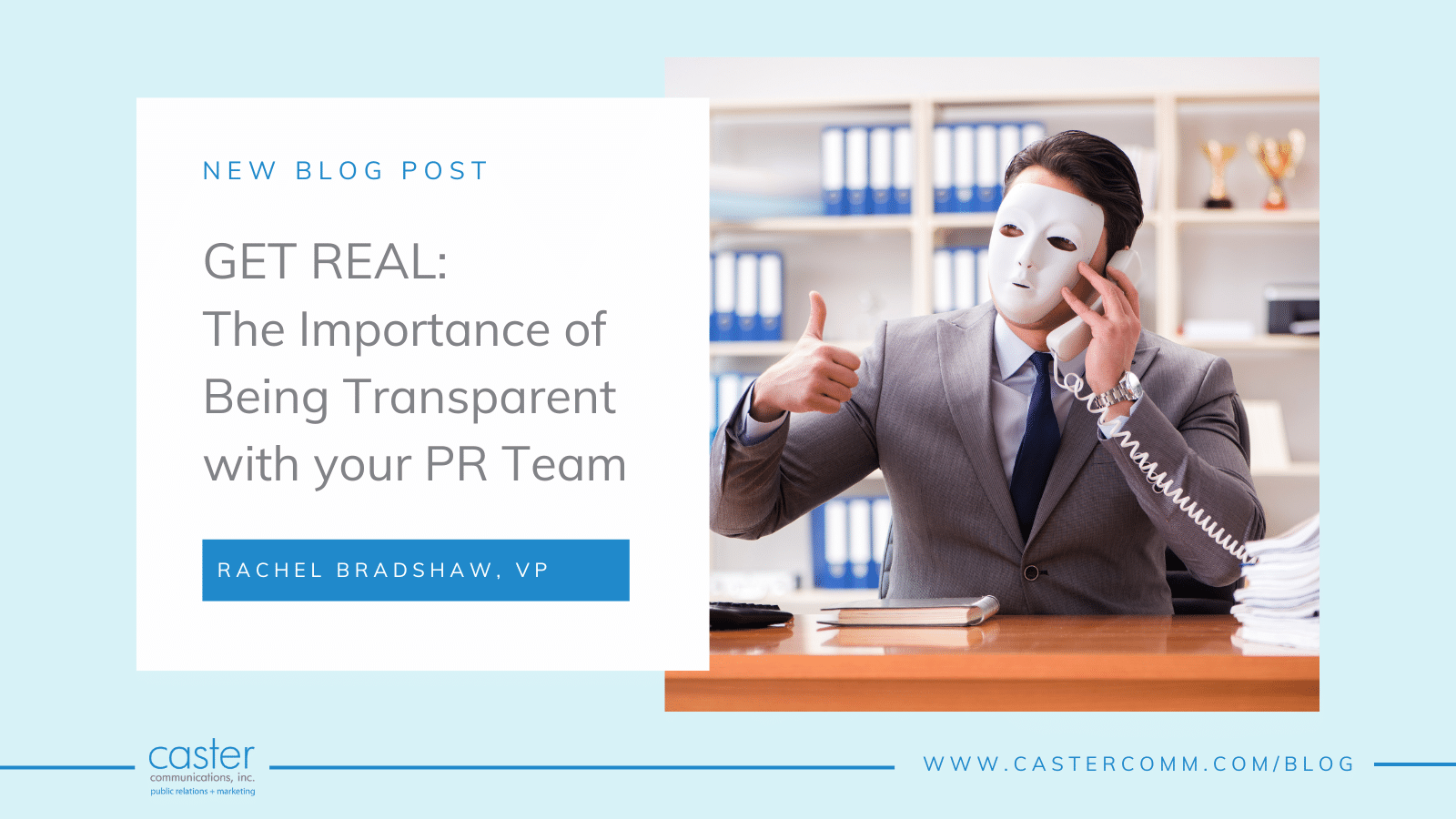
Get Real: The Importance of Being Transparent With Your PR Team
A well-crafted narrative. Consistent, disciplined messaging. Punchy, memorable soundbites. For any given question, a perfectly calibrated answer that draws your interlocutor’s attention to the facts and trends you want to highlight, carefully avoiding any topics you’re not willing to see in print. These are some of the outputs of a functional PR program.
They cannot be the inputs.
All too often, clients talk to their PR team like they’re practicing to speak to the media. They dodge, obfuscate, spin and withhold. That’s not a good way to talk the media – but it’s an absolutely foolish way to treat your PR team. When clients insist on holding us at arm’s length, we cannot strategize effectively. If they withhold potentially damaging or unflattering information, we can’t prepare them to answer tough questions. We won’t even know what curveballs members of the press are most likely to throw.
Trust is hard, but consider this: We have every incentive to protect your reputation as if it was our own, because it is. The media knows who our clients are. If one of them does or says something absurd (not than any clients on our current roster would; they’re all perfect angels), we’re as likely to get a nasty-gram as the CEO. The whole situation reminds me of high school, when I would bear the blame for my friends’ misbehavior. I’ll never get over my drama teacher asking me “RACHEL! Why did you let Nathan tell DJ to do that?” BECAUSE THEY PASSED NOTES BEHIND MY BACK, MOM. (Yes, my mom was my drama teacher, and no, I don’t think that needs to be unpacked at all.)
I refuse to allow these grade-school antics to follow me into professional life. No passing notes behind your PR team’s back: We need thorough, honest disclosure to do our jobs. Honestly, I’ve often wondered what clients are thinking when they withhold a vital piece of information or try to cloak the truth in a fog of anodyne talking points. I have a few theories – and if any of these resonate with you, I also have some real talk for you.
“If I distract my PR team with possibilities, they’ll waste billable hours preparing for crises that might never occur.”
You know what wastes billable hours? Paying for time and a half while your team works nights and weekends to extinguish a fire they only learned about after it became a full-blown conflagration. If you keep us informed of a potential issue as soon as you smell smoke, we can incorporate tracking, research, and message development into the regular account maintenance we’re doing anyway. Our priorities won’t change because of a far-off threat – but if that threat becomes a reality, we’ll be ready to spring into action. We’ll know how the media is currently covering the topic, what messaging is most likely to resonate, what risks to mitigate and which opportunities to seize.
“If I share sensitive information with my PR agency, it might leak.”
We have NDAs for a reason, and we take them seriously. We’re not going to share anything with the press you didn’t approve. We throw up firewalls between teams operating in the same market, ensuring there’s no potential for internal information bleed or conflicts of interest. What you tell us in confidence stays in confidence; there’s no other way for a PR agency to operate.
“If I’m always on message, even with my PR team, I’ll win every interview.”
This is maybe the toughest myth to get past. I’ve worked with some very practiced communicators whose every sentence could be spoken into a live microphone. That sounds like a gift, but it can just as easily become a curse. These talented talkers are always, at least on a subconscious level, trying to control the perceptions of whomever they’re speaking to. This causes them to instinctively withhold information, and to say what they think the target audience wants to hear instead of what they actually think.
These spinmasters may sound good in the short term, but their interactions often lack depth. If you constantly speak only in pre-approved, market-tested messaging, you never say anything interesting or surprising. Your unique expertise and insights- your personal perspective – are where the story gold is! Be real with us so that we can help the media understand why they want to talk to you instead of another leader in your field. Share your worries, your unpopular opinions, your frank assessments. Together, we’ll figure out how to articulate what your company is doing differently, and what you can offer as an expert that no one else can.
Learn more about the right way to prepare for media interactions on the Caster Blog:
- Embracing Partnership: Integrating a PR Agency into Your Team
- Mastering Becoming “Media Ready”
- The Human Experience as a PR Foundation
It’s usually by having something interesting and real to say, rather than by saying nothing in a way you think sounds interesting. Don’t do that to the media, and in the name of all that is holy, don’t do it to me.

